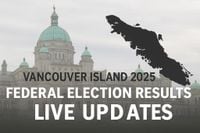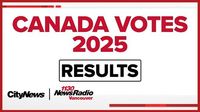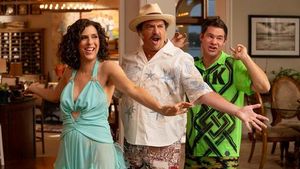The 2025 Federal General Election results have been steadily rolling in from across British Columbia, with significant outcomes reported from key ridings, including Nanaimo-Ladysmith and Courtenay-Alberni. As the polls closed at 7 p.m. local time on April 28, 2025, voters across the province cast their ballots, leading to a dramatic evening of results.
In Nanaimo-Ladysmith, Conservative candidate Tamara Kronis has emerged victorious, securing approximately 35.2% of the vote. With 199 out of 205 polls reporting, Kronis garnered 25,539 votes, surpassing her nearest rival, Michelle Corfield of the Liberal Party, who received 20,245 votes (27.9%).
“This is not the result I was hoping for,” said Paul Manly of the Green Party, who finished in third place with 13,356 votes (18.4%). Manly congratulated Kronis on her win during a gathering at the Beban Park Social Centre. He emphasized his commitment to continue advocating for the community, focusing on issues such as affordable housing and climate change.
Corfield, who monitored the results with supporters at her campaign office, expressed pride in her campaign efforts. “I think we raised the right issues at the right time and put them on the floor in the midst of all the chaos and confusion that has been plaguing politics as of recent,” she stated.
Meanwhile, in Courtenay-Alberni, incumbent Gord Johns of the NDP was declared elected with 26,980 votes, defeating Kris McNichol of the Conservative Party, who received 23,765 votes. This race highlighted the ongoing strength of the NDP in the region, despite broader trends observed in other areas.
The results from the 2025 federal election have shown a mixed bag across British Columbia, with the Liberal Party, led by Mark Carney, expected to form a minority government once again. As of the latest updates, they had 144 current elected seats and were leading in 22 ridings. The Conservative Party, under Pierre Poilievre, was tracking closely with 121 seats and leading in 27 ridings.
In Vancouver, the election was closely watched, particularly in the riding of Vancouver Kingsway, where NDP incumbent Don Davies faced a tough challenge from Liberal candidate Amy Gill. With 155 of 193 polls reporting, Davies had a slight edge, leading with 13,185 votes to Gill's 13,267, reflecting a fierce battle for a seat that has been a stronghold for the NDP.
In Vancouver East, Jenny Kwan of the NDP was able to maintain her lead with 10,445 votes against Liberal Mark Wiens, who had 8,890 votes. The Conservative candidate, Lita Cabal, was also performing relatively well, showing a competitive spirit in what has traditionally been an NDP stronghold.
Other notable results in the Vancouver area included Gregor Robertson, running for the Liberals in the newly renamed Vancouver Fraserview-South Burnaby, who led with 7,908 votes against Conservative Avi Nayyar's 6,589 votes. Hedy Fry, a long-serving MP, was on track to win her 11th term in Vancouver Centre, leading with 9,491 votes.
As the night progressed, the voter turnout across British Columbia was reported at 61.35%, with 17,501,450 of 28,525,638 registered electors casting their votes. This turnout reflects a robust engagement from the electorate in a crucial federal election.
In total, 172 seats are needed to form a majority government, and as results continue to come in, the dynamics of power in the House of Commons are becoming clearer. The Liberal Party's ability to secure a minority government suggests that they will need to navigate a complex political landscape, engaging with other parties to pass legislation.
As the live updates continue, attention will now turn to the implications of these results for the future of Canadian politics, particularly in light of the challenges faced by the NDP and the performance of new Conservative candidates in traditionally liberal areas.
In the meantime, the focus remains on the local issues that resonated with voters, as candidates like Kronis and Johns emphasize their commitments to their communities. The 2025 federal election has not only reshaped the political landscape but has also underscored the importance of local representation in the federal government.
With more developments expected in the coming days, the outcomes of this election will undoubtedly influence the direction of Canadian policy and governance.





